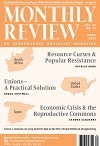Volume 65, Issue 11 (April)

The insidious nature of the economy, state, and cultural apparatus of global monopoly-finance capital is difficult to perceive—if only because it is to be found everywhere we look. Focusing on a specific case can therefore help us see what might otherwise elude us. A striking instance of this principle is to be found in the recent takeover of Chrysler by Fiat—linking a century-old Italian auto dynasty, the Great Financial Crisis of 2007–2009, the U.S. corporate bailout, the 2014 Superbowl, and the American folk music tradition. | more…
The African National Congress (ANC), led during the 1990s by the late Nelson Mandela, is projected to be reelected in South Africa’s May 7, 2014 national election by a wide margin, probably with between 50 and 60 percent of the vote. But underneath the ruling party’s apparent popularity, the society is seething with fury, partly at the mismanagement of vast mineral wealth. The political and economic rulers’ increasingly venal policies and practices are so bad that not only did ANC elites play a direct role in massacring striking mineworkers in August 2012, but corporate South Africa was soon rated by PriceWaterhouseCoopers as “world leader in money-laundering, bribery and corruption, procurement fraud, asset misappropriation and cybercrime,” with internal management responsible for more than three quarters of what was termed “mind-boggling” levels of theft. | more…
In the past few years numerous authors have examined how the current economic crisis in Spain has differential impacts on women and men. While this is important to show, this article’s goal is to make the leap from a mere description of the gendered effects of the crisis, to an analysis of some of the very gendered processes that shape it at its core. In other words, the intent is to understand how both the crisis itself and the ways the state manages it are structurally shaped by gender.… [This article will argue] that the primitive accumulation, or accumulation by dispossession, currently taking place in Spain is deeply shaped by gender in the sense that one of the main strategies capital develops, and the state implements, is to push the responsibilities that the state formerly had for public welfare back onto women and households. | more…
After the Second World War, autoworkers gained higher wages and benefits. We were separated from our class financially and in the process we embraced an economic system which causes global human misery. A misery which has come back to haunt us like a self-inflicted disease, an illness born of uncontrolled appetite. Many of my comrades worked excessive overtime, gambled on the stock market, and invested in extravagant real-estate ventures. They were buried so deep in debt that a strike was unthinkable to them. They couldn’t afford to miss a payment to the man. Everything they earned was turned over to dealers who already had plans for all the money these workers would ever make in their lifetimes. Consumption appeared to be an end in itself. The only difference between these good hard workers and junkies was that the capitalist system conferred status on their addiction. | more…
It was an honor to have my essay “A Radical Approach to the Climate Crisis,” from the summer 2013 issue of Dissent, “read with interest” by the editors of Monthly Review, even if the editors took issue with my argument that the timeframe of climate science indicates that getting off fossil fuels must happen starting immediately and be completed in only a few decades.… As Marxists, the editors of MR should be as radical as reality itself, even when that offends intellectual sensibilities and requires a new flexibility. Anyone literate in climate science must admit that the short-term struggle to mitigate carbon emissions is an essential precondition for achieving any other larger, longer-term goal. The science on this is clear: there is no time left to wait, carbon emissions must come down as soon as possible and as fast as possible. | more…
Our friend and MR author Christian Parenti misunderstood our brief comments (“Notes from the Editors,” MR, November 2013) on his article in the summer issue of Dissent. We did not challenge the science of climate change, which tells us that carbon emissions must cease before one trillion metric tons of carbon have been emitted—a tipping point that will be reached in about 2040 under business as usual. There is no question that the fossil-fuel industry must go. In fact the reality that the world is confronted by a planetary emergency with respect to climate change (and the global ecological problem as a whole) and that the critical threshold will likely be approached by around 2040 (or even sooner) under capitalist economics as usual, is one that has been insisted upon by Monthly Review for twenty years. | more…
The Grass-Roots Struggle Against the Oil Plunder in Iraq
Greg Muttitt quotes an Iraqi friend who pointed out that there would be two phases to the war in Iraq: first the U.S. invasion and occupation, and second the struggle over the gas and oil. Ten years after tanks rolled across the border from Kuwait, the second phase continues.… There is still no oil law, which the United States has pushed hard to get passed since 2007 and the Iraqi Parliament has no desire to pass soon. This means that the oil rush by the multinational oil companies goes on in a legal vacuum. While the international press blames sectarian strife for holding up the law, it is, in fact, due to a broad people’s struggle for sovereignty. | more…
